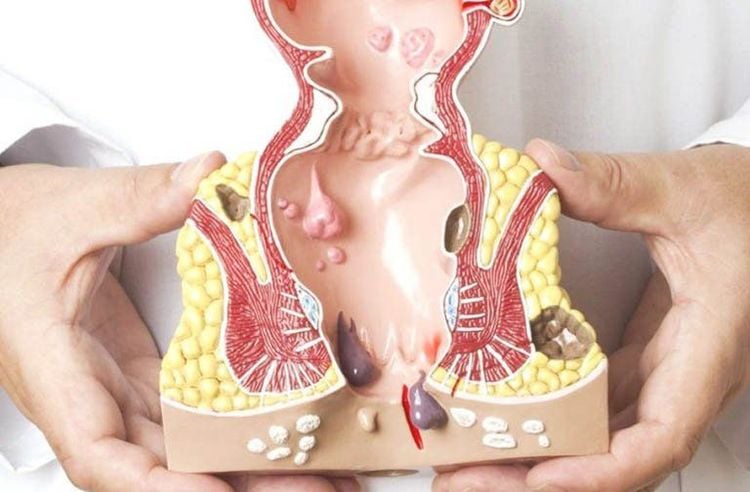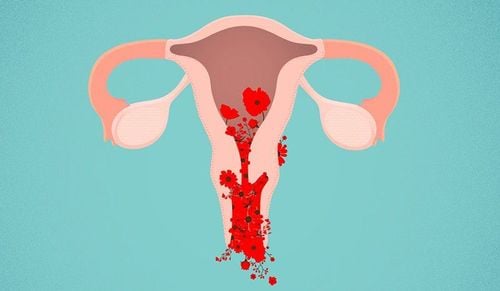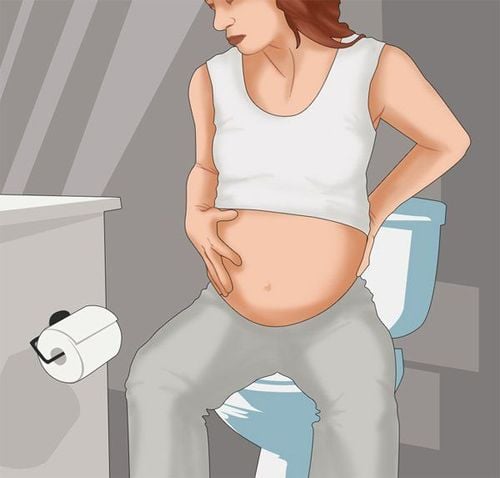There are many medical conditions that can cause anal pain, which is discomfort, and can reduce the quality of life. To treat this symptom, it is necessary to know its cause.
The anus is at the end of the digestive tract, only about 3 cm long, and very important in expelling waste to the outside environment. The anus contains pathogenic
microorganisms, so there are many reasons why this part is swelling and painful. Below are some common causes of anal pain:
1. Anal fissure
An anal fissure is a condition that causes a tear in the anal canal, usually in people who suffer from frequent constipation or chronic diarrhea. When the stool is dry and hard, the patient has to push, gradually leading to a tear in the anus, the symptoms of this condition include:
- Anus can be burning and bleeding, especially the patient feels pain and there may be blood spot after pooping;
- Uncomfortable itching and swelling of the anus after defecation;
The skin around the anus has cracks and excess skin appears.
Mild anal fissures can be alleviated if the patient is not constipated or has diarrhea. However, when it's severe, it causes pain and bleeding and requires treatment.
2. Perianal abscess
Perianal abscess is an infection caused by bacteria. When the perianal abscess is not treated in a timely manner, it will grow larger and burst, the patient will see pus draining out, which can cause anal fistula. When having it, there are symptoms such as fatigue, fever, itching, blood and mucus in the stool.
This condition can increase the risk of cross-contamination to neighboring organs and cause many complications such as anal fistula, sepsis ... Anal abscess needs to be treated with antibiotics, anti-inflammation, draining procedure, and keeping the anal area clean.

3. Anal fistula
This is a common complication when an anorectal abscess not being treated early and properly.
Anal fistula is a condition in which one or more fistulas appear from the inside of the anus to the perineum. Anal fistula causes patients to have anal swelling, pain, and itching; bloody stools or mucus in the stool; an unpleasant odor.
In order to treat anal fistula, a surgery is required.
4. Hemorrhoids
Hemorrhoids are also a common cause of anal swelling. Hemorrhoids are varicose veins of the hemorrhoid, causing blood stasis and creating a tuft structure. Those at high risk for treatment include:
- Chronic constipation;
- Pregnant women;
- People with chronic bronchitis...
Hemorrhoids are divided into 3 types, including internal hemorrhoids, external hemorrhoids and mixed hemorrhoids. Hemorrhoids are classified according to their position relative to the dentate line: external hemorrhoids occur below the dentate line and internal hemorrhoids occur above the dentate line, while hemorrhoids that appear either above or below the dentate line are called mixed hemorrhoids.
In addition to symptoms of anal swelling, the patient may have other symptoms including:
- Anal itching sensation.
- Bleeding after defecation, if severe, may appear when doing heavy work.
- Anal pain.
- Feel the hemorrhoid sticking out.
When the anus is swollen and painful due to hemorrhoids, the patient should modify the diet to avoid constipation, do not do hard labor, do not sit for a long time in one position and need to combine drug or surgical treatment when other ways are not effective.
5. Inflammation of the anal canal
Anal inflammation that occurs in the anal canal can be caused by diseases such as enteritis, anal infection or chronic diarrhea, some bad eating habits such as the use of spicy and spicy dishes...
Swollen anus may be accompanied by other signs including:
- Blood in the stool and pain when passing stools.
- Feeling itchy in the anal area.
- Alway want to go to the toilet.
- Pain in the lower abdomen.
6. Crohn's disease
Crohn's disease can also be a reason for a swollen anus. It most commonly causes ulcers in the inner wall of the small intestine, the jejunum and colon, but can also affect any parts of the digestive tract, including the anus. Common symptoms of Crohn's disease include:
- Lower abdominal pain, diarrhea.
- Painful swelling around the anus.
- Patients often have a fever.
- Unusual discharge from the anus and painful swelling.
Crohn's disease usually cannot be cured, but medication can be used to reduce the progression. In addition, it is necessary to screen for the risk of anal - rectal cancer early because this disease increases the risk of gastrointestinal cancer.

7. Anal Cancer
This condition is quite rare, which is caused by the abnormal growth of cells in the anus. When the anus is swollen, pain can also be a sign of anal cancer. Manifestations of anal cancer may include:
- Anal bleeding.
- Itching and burning anus.
- Discomfort in the anal and rectal area.
- Abnormal discharge from the anus.
- Change in bowel habits such as frequent constipation or diarrhea.
- Abnormal mass was found in the anorectal region.
The signs of anal cancer are relatively similar to those of other diseases, so it is difficult to distinguish.
The above are possible causes of anal swelling. To know how to handle a swollen anus, you need to determine the cause of it. Depending on the cause, there are different treatments. To prevent the disease, you should clean the genital area, eat a suitable diet to avoid digestive disorders and visit a doctor when there are abnormal manifestations.
To arrange an appointment, please call HOTLINE or make your reservation directly HERE. You may also download the MyVinmec app to schedule appointments faster and manage your reservations more conveniently.













